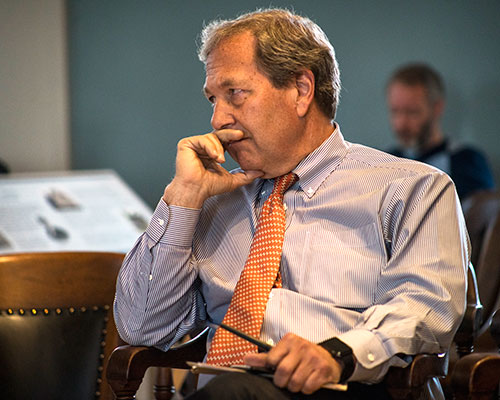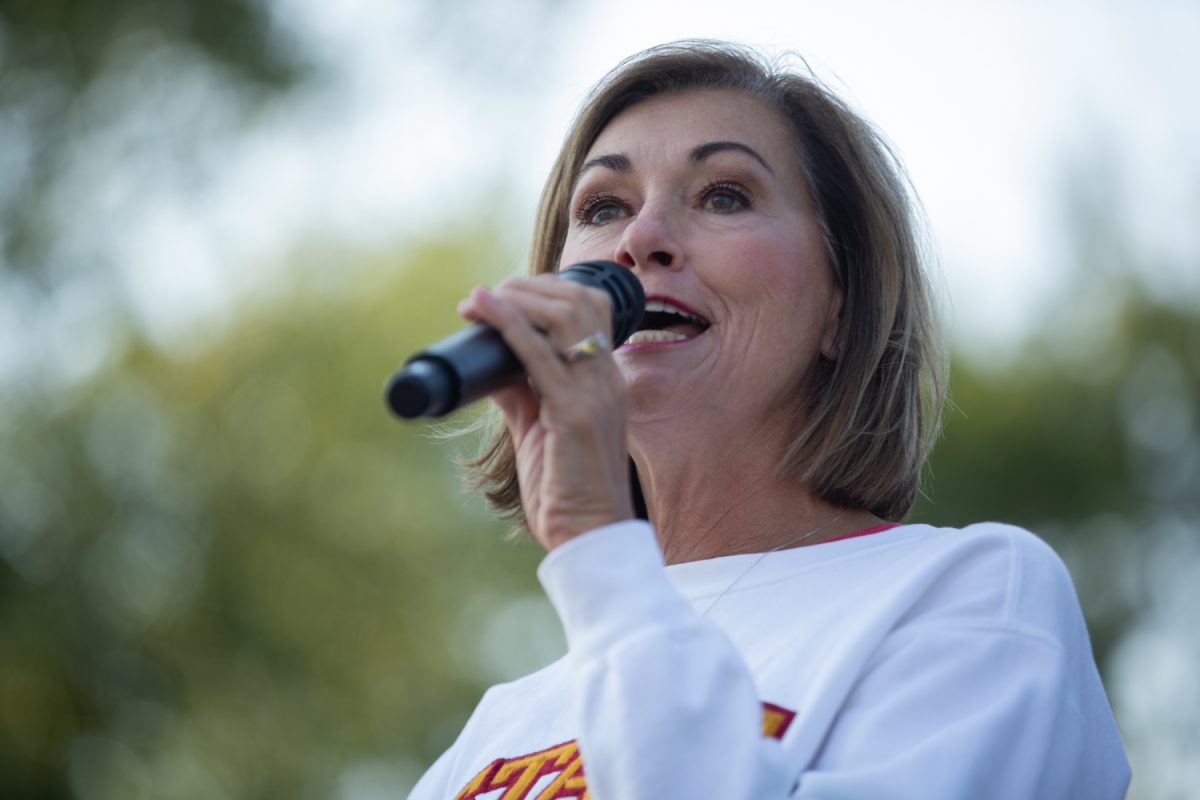By Brad Pector
This story was originally published on www.krui.fm on May 4, 2016
Bruce Harreld is a symbol in Iowa City — a symbol of plutocracy and ignorance. He lives comfortably atop his new throne, his rich voice reigning over thousands of people in our intellectual community, far away from its previous echo in the walls of IBM and Boston Market.
Beholden to a belief system that seems to demand silence (he often refuses to answer questions during public forums) this plutocrat is complicit in destroying our democracy (UI Student Government and UI Faculty Senate both voted “No Confidence” in response to the presidential search). Soon enough, our community will see funding cuts, more bureaucratic discourse trumping faculty and student rights, and a continued lack of social awareness on the behalf of administrators. We, the people of the university, will crumble underneath the University of Iowa’s house of cards.
Harreld, a longtime member of the 1 percent, is a barometer for privilege and status — “give him a chance” and “he needs to resign” being the polar arguments into the plunge that is the heated controversy behind UI’s new president. In many of the articles written on Harreld, we witness facts and critical analysis (ditchwalk.com & bleedingheartland.com), but one fact has been left out: Harreld doesn’t truly care about the people here, and he never did. Now he’s trying to care, as it may cost him his $590,000 a year job (plus $1 million in deferred compensation over five years).
It isn’t about Harreld’s lack of higher-education experience or his background as a corporate businessman — no, these qualities aren’t inherently negative. What this is about are the people who look to Harreld to make positive changes — the undergraduate students — and they haven’t been fed a word of good news.
Among announcements of redistribution of funds, and Harreld’s “????” PowerPoint bullet in regards to the source of university funding, his internal dialogue was finally revealed. It’s clear that he wasn’t hired for his ideas but for his blank rhetoric — “great to greater” analogous to “Make America Great Again.” He seems to be veiling ignorance but cannot admit to it. Why doesn’t a president of a university have any solid plans for moving forward? What are his motives?
To the state Board of Regents, he may have come off like a man with a vision and probably more, but a privileged, majority white bunch as they are, they don’t understand the needs of all people; look at their backgrounds. None of them were ever forced to confront the challenges of higher education. Remember, these are people that still force us to submit all of our input on their omnipresent behavior within an hour, onto a tiny camera in a small room. We can only sit and hope that one of the regents listens to it later, let alone mildly acknowledges the points being made. Even Harreld, who won’t push for state funding or social issues on campus, stated in his recent town-hall meeting that he doesn’t think this is acceptable.
But there haven’t been any changes in terms of these camera room “transparency meetings,” or Iowa law in general. The regents continue to remain distant and inept, completely lacking community engagement and, as stated before, transparency, two of their “core principles.” Aside from their sketchy, non-human public interactions, they chose a president almost no one wanted, enabling him to speak on campus before anyone else.
With all of this taken into account, there is enough evidence here to show the court system their inability and dysfunction, proving them to be an illegal and illegitimate governing body. Not even the AAUP can sanction them (there are no regulations for government bodies currently) as we have seen them do to our university. With no permanent residence in Iowa, and with only one Iowa City meeting a year (ironically, they are considering fewer meetings [Gazette]), the regents are absolutely untouchable.
With checks and balances thrown out the window, shared governance thwarted, and an outstanding lawsuit against them, the regents are fundamentally corrupted. They have tainted the UI President’s Office with an iconic, undemocratic talking head: Harreld.
While Regent President Bruce Rastetter and Gov. Terry Branstad hide beneath the veil of our problematized public-education system, Harreld continues to make people at the university feel uncomfortable. Ultimately, the problem isn’t with what Harreld wants, because it doesn’t seem like he has much to offer. The problem is with what he doesn’t know and what he continues to misunderstand. He has a lot of power, and without the knowledge or adequate care it takes to be a president of a university, he will be dangerous. He’s not only dangerous to issues of funding but dangerous in that it could spell even further disenfranchisement of minority students, international students, lower-class students, or anyone that falls outside the category of sports, where Harreld seems to have the most motivation. He remains silent to the idea of social justice, including talking to Branstad about increasing state appropriations (Iowa’s state budget is ~$7 billion) to take the burden of heightened tuition off of students.
In 1981, state appropriations accounted for 77.4 percent of the revenue for Iowa’s public universities, while tuition only accounted for 20.8 percent. But in 2015, state appropriations sat at a measly 34.7 percent, while tuition peaked at 60.7 percent of the total revenue. The casual kiss of financial lines in 2009 went seemingly unnoticed — their intersected paths predetermined to grow apart again, this time in the opposite direction, resulting in a youth-draining effect: Students are deep in debt. Some see this inevitable future and go out of the country for education that is nearly free. But here, our lack of state funding continues to be a detriment to the future of students’ finances. To some degree, students are willing to fight for its reversal, but this drastic flip in the source of revenue is too much for them to handle on their own.
To this, Harreld insists we need a “backup plan,” “B&C,” implying he won’t be successful in pushing Rastetter, his appointer, to appropriate more funds for the university. Rastetter continues to pit the universities against each other, and Branstad, who appointed Rastetter, has been cutting public funding from the UI for years. To quote the book of John (or Bruce), “The Son can do nothing of himself but what he seeth the Father do: For what things soever he doeth, these also doeth the Son likewise” (5:19).
In addition to this lineage of power, Regent Mary Andringa, one of the regents who appointed Harreld, recently resigned from the board after she failed to submit proof that she was a director of Herman Miller, a furniture manufacturer. This manufacturer recently won a multimillion-dollar contract with the UI. What other corrupt regent activities are we unaware of? Why did the regents pick Harreld?
While the other candidates for UI presidency climbed to the title of provost, Harreld worked for Boston Market and IBM. Now, for some reason, he’s started at the top of the higher-ed food chain, with no fundamental platform other than trying to raise funds in a yet-to-be-decided way (remember, he needs ideas from you about this). We were lucky to get one public forum this year.
And there’s the rub. Harreld is lost; he’s completely out of his sector, and he fundamentally doesn’t connect with people on campus because he doesn’t understand the issues or adversity they encounter on a daily basis. His previous experience is capital and profit — now, he’s living in a value and ethics world. And rather than someone such as Joseph Steinmetz or Michael Bernstein, Harreld has low favorability because, frankly, he doesn’t know what to do with a community that isn’t a business one. That’s why he has made his job ours, and we, studying, working, and largely unorganized, cannot actualize our ideas in Harreld’s “come visit me” input system, let alone “make real the promises of democracy” like Martin Luther King Jr. believed we ought to do.
Harreld has long ignored this; his “come and get involved” town-hall rhetoric only shows his naïveté. When you’re electing a president, a fundamental leader in society, you would think that person would be highly motivated and excited to implement an idea of what a just and ethical institution looks like. But Harreld does not independently bring up issues that concern him, and even when the community brings forth issues, he doesn’t take action outside of his discussion with an advocacy group. Brief introductory meetings don’t change systemic problems; his vision is neglectful.
Why doesn’t he cut Iowa’s (well above-average) administrator pay to help offset other costs? Why didn’t he advocate for any specific issues past raising faculty salaries (by raising tuition)? Why won’t he raise the minimum wage on campus? Many universities suffer from the same systemic problems, so it’s not like the UI is unique in its faults. How has he shown his awareness or care? He hasn’t, and instead, he’s resorted to supporting us through the carefully construed Iowa Now narrative. But it’s shallow and soulless. We get it, Bruce, you like us, we’re great. But have you ever understood our community’s issues?
We already know the answer to this. The first public forum was a mess because Harreld asked us to do his job for him but without the capabilities to actualize our needs. If he truly cared about the people here, if he truly cared about the gross number of sexual assaults on campus, if he truly cared about the rampant racism experienced by people of color, if he truly cared about any social or financial issue the university is having, he would have made a plan to begin with.
Harreld should be angry and frustrated, as we are. He should have worn it on his face. But this is what plutocrats do best: front our ignored issues in façade, while they bask in the comfort of their throne. All we observe from Harreld is confusion and obfuscation — the breadcrumbs of a socially ignorant, wealthy, privileged man — far from his core comfort zone of exploited labor and eight-digit profits.









